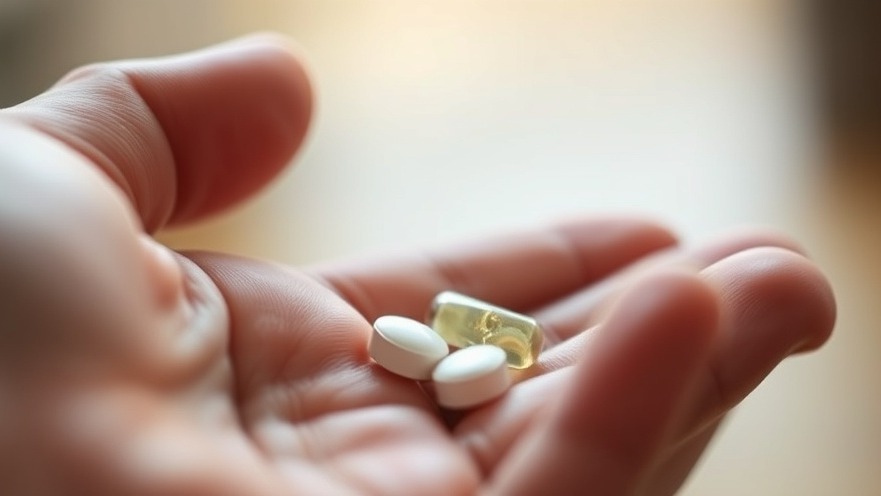
Understanding Iodine: Why It Matters
Iodine is a vital nutrient that plays a critical role in maintaining thyroid function, affecting everything from metabolism to mood. Most people probably don’t give much thought to iodine unless it’s brought up, but it’s an essential mineral that must be included in our diet. The thyroid hormones, labeled T3 and T4, are named after the number of iodine atoms they contain, highlighting how integral this nutrient is to our body. The challenge for many, especially those on plant-based diets, is ensuring they get enough iodine without relying on common sources like dairy or iodized salt.
Vegans and Iodine Deficiency: A Growing Concern
Research indicates that many vegans may not be aware of the risks associated with iodine deficiency. As the popularity of plant-based diets grows, more individuals are cutting out dairy, which is traditionally a primary source of iodine. Besides dairy, many commercially available plant-based milks lack sufficient levels of iodine, averaging only about 3 mcg per cup compared to the 150 mcg recommended daily intake. Therefore, it's crucial for those adopting vegan lifestyles to actively seek out sources of iodine such as seaweed or consider supplementation.
Real-Life Consequences: Case Studies
Consider the case of a three-year-old who was raised on a diet of plant-based, unsalted foods. The lack of iodine resulted in serious health issues, first appearing as a goiter, a clear indication of iodine deficiency. Unfortunately, such scenarios aren't isolated. Another example is a toddler who fell ill after weaning, as the mother had stopped taking prenatal vitamins that contained iodine. These real-life cases illustrate the importance of iodine in childhood development, especially when transitioning to a vegan diet.
The Importance of Iodine During Pregnancy
For women, especially those who are pregnant or planning on becoming pregnant, iodine plays a crucial role in fetal neurodevelopment. Despite recommendations from the American Thyroid Association and the American Academy of Pediatrics that women consume 150 mcg of iodine daily through prenatal vitamins, many do not. Shockingly, approximately 40% of prenatal vitamins in the U.S. lack this essential mineral. Hence, it’s vital for women to read labels closely and consider their iodine intake responsibly.
Plant-Based Milk: A Missed Opportunity
Many plant-based milk brands focus on fortifying their products with calcium and vitamins B12, D, and A but often neglect iodine. This oversight poses a significant risk for people who depend solely on these alternatives for their nutrition. A report found that out of 47 plant-based milks analyzed, only three were fortified with iodine. Those that were fortified managed to match the iodine content of cow's milk, but this is far from the norm.
Mitigating the Risk: Ensuring Adequate Iodine Intake
So how can individuals, especially vegans, ensure they receive adequate iodine depending on their dietary choices? One effective way is by incorporating foods rich in iodine, such as sea vegetables like nori or kelp, into daily diets. Additionally, individuals should consider iodine-containing supplements if their diet lacks sufficient sources. Community education is vital here; raising awareness about iodine's importance can help prevent deficiencies.
Addressing Common Misconceptions
There is a pervasive myth that if a diet is healthy, it will also be nutrient-complete. However, this isn’t always the case. Just because a food is plant-based doesn’t automatically mean it provides all the essential nutrients required for health. Many assume that cutting out foods like dairy and iodized salt doesn’t affect nutrient intake, but as we've discussed, it can create significant gaps, especially with iodine.
Beyond Nutrition: How to Advocate for Iodine Awareness
As consumers become more health-conscious, fostering conversations around the importance of iodine can help bridge the gap in knowledge about dietary needs. Community workshops, social media campaigns, and educational resources can aid in raising awareness about adequate iodine intake in various diets. By promoting a dialogue about iodine’s role in nutrition, society can better facilitate healthful choices beyond just for vegans and vegetarians, benefiting pregnant women and children alike.
Take Action: Make Informed Dietary Choices
Understanding your iodine intake is crucial, especially for those following restrictive diets. It’s encouraged to read labels, consider potential supplementation, and share this information widely. Knowledge is power; ensuring adequate iodine consumption can fundamentally change lives, especially during critical stages of development like pregnancy and early childhood. Don’t wait for symptoms of deficiency; proactively manage your nutritional health for the betterment of you and your family.
 Add Row
Add Row  Add
Add 




 Add Row
Add Row  Add
Add 

Write A Comment